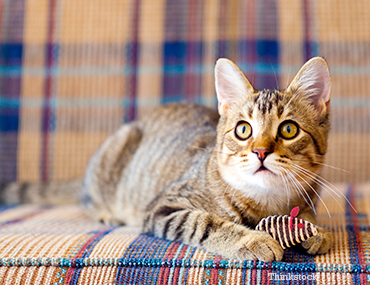
Dr. Ruth MacPete dedicates this blog to therapy dogs. For more from Dr. MacPete, find her on Facebook or at www.drruthpetvet.com!
I recently received a package of catnip in the mail. As I usually do, I dropped it off on the coffee table with the rest of the mail and went upstairs to change. After returning downstairs to get a glass of water, I entered the living room only to walk into a disaster. The package of catnip was ripped into shreds and there was catnip scattered across the floor. It wasn’t too hard to figure out what had happened: the guilty parties were rolling in the catnip with big feline grins plastered on their whiskery faces, too dazed and confused to know whether to run or to blame the dog. It looked like a catnip grenade had exploded but all I could do was to laugh and giggle. As I was cleaning up the mess, it made me think about catnip. What kind of plant is it and why does it make cats crazy?

What is catnip?
Catnip, known scientifically as Nepeta cataria, is a member of the Lamiaceae, or mint family. Originating from Asia, Africa and Europe, it is now found all over the world and grows as a weed. Catnip is also used as an ornamental plant in many gardens because it is drought tolerant, deer resistant, and repels many insects. Interestingly, in addition to appealing to cats, its essential oil nepetalactone also attracts butterflies.
Why do cats love catnip?
Nepetalactone is found in the leaves and stems of catnip. When it enters a cat’s nose, it binds to receptors on sensory neurons lining the nasal cavity. These neurons project to the neurons located in the olfactory bulb, which in turn activate different areas of the brain that control emotion and behavior. The effect is that cats tend to roll in it, lick it, and even eat it. Some meow and run around wildly, while others drool or become sedate and docile. The exact response depends on the cat and the dose consumed or inhaled. Like many things, the more your kitty eats or inhales the stronger the effect. In fact, some cats that binge too much may become anxious and even a bit aggressive. Luckily, the effect wears off quickly and usually within 15 minutes most cats are back to normal. Apparently, one third of all cats are not affected by catnip but I personally have not met a cat that didn’t seem to love it. Scientists believe that a cat’s response to catnip is hereditary and only affects sexually mature cats 6 months and older.
Is it dangerous?
Despite the crazy effects it has on some cats, catnip is harmless to our feline friends. And although cats seem to go mad over catnip, it is not addictive. So if your cat is a recreational catnip user, no need to worry about having to send him off to a feline Betty Ford center. Just let your normally sophisticated feline let loose and let their inner goofy kitten out!
If you have any questions or concerns, you should always visit or call your veterinarian – they are your best resource to ensure the health and well-being of your pets.
